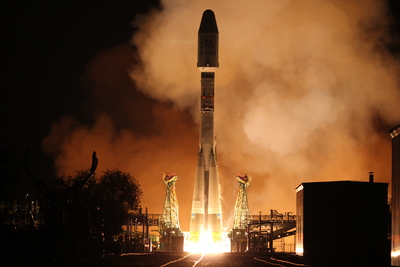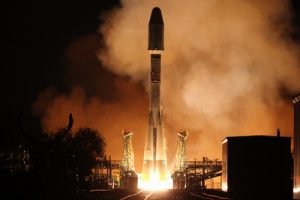
On September 17, European weather satellite MetOp-B launched aboard a Soyuz-2.1a rocket with Fregat booster from Baikonour Cosmodrome. All seemed to go as plan, and ESA handed control of the satellite over to EUMETSAT for testing and operations a couple days later. But it seems MetOp-B’s arrival in its intended polar orbit entailed an element of luck, with unofficial reports surfacing that the Soyuz’s second and third stages cut off unexpectedly early.
Anatoly Zak of russianspaceweb.com quoted industry sources as saying that the stages cut off seconds earlier than planned possibly resulting from a command from SAZ, the Emergency Defense Mechanism. “SAZ monitors the performance of the propulsion system and can trigger its shutdown, if certain parameters indicate a possible emergency onboard, such as an explosion,” said Zak, citing unofficial sources. The mission was saved by the Fregat stage, which compensated for the shortened boost.
The report comes on the heels of a problem with the Soyuz TMA-06M capsule’s avionics box that has delayed the launch of the second half of Expedition 33 to the International Space Station and just after conclusion of the investigation into an August 6 Proton-M failure that stranded two satellites in the wrong orbit. Although the spacecraft are unrelated, Russian launch failures have become more frequent in recent years, with attempts at mitigating root causes falling short of the mark.
The MetOp-B satellite is the second in a three part series of meteorological satellites and will replace MetOp-A, which has been orbiting since 2006. MetOp-C is scheduled to launch in 2017. The 4,100 kg MetOp-B is designed to operate in the intervening five years. The first and second MetOps are expected to overlap for some time since MetOp-A is still functional, although beyond its design lifetime, providing even more data to assist with weather forecasting and climate monitoring. The MetOp craft are designed by Astrium, carry instruments from ESA and NASA, and are operated by EUMETSAT.
Watch the satellite’s launch below:


















































































































![A trajectory analysis that used a computational fluid dynamics approach to determine the likely position and velocity histories of the foam (Credits: NASA Ref [1] p61).](https://www.spacesafetymagazine.com/wp-content/uploads/2014/05/fluid-dynamics-trajectory-analysis-50x50.jpg)



Leave a Reply